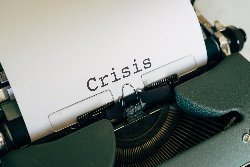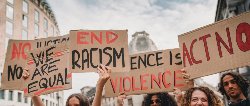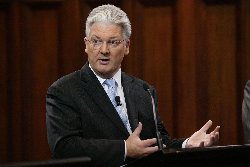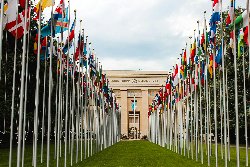Gordon Campbell on Oprah as a presidential hopeful

Oprah for President…That was one of those summer silly season stories, right ? Maybe not. On the morning after the Golden Globes Awards ceremony where she delivered That Speech (“I want all the girls watching here now to know that a new day is on the horizon!”) a lot of people seem to have woken up in the cold light of day with a vision of President Winfrey still dancing in their heads. Oprah’s presidential run may have legs.
So….a whole week later, what do we actually think about the idea of the leader of the Western world (until Trump arrived, that’s how we used to describe US presidents) coming down to a choice between Oprah Winfrey and Donald Trump? To all intents, an election match-up between those two would mark the death knell of any notion of politics as a contest between competing policy programmes and ideologies. Initially at least, the 2020 presidential race would be all about brand names and personal likeability.
If Winfrey is serious about running, the first week of reactions would have been heartening for her. Oh, a few critics did emerge in the likes of the New York Times and this article on Slate was particularly savage, but on the whole, the nation didn’t exactly recoil in horror. Some commentators even argued that Winfrey could be able to mobilise sectors of the electorate that the current crop of Democratic hopefuls would struggle to reach.
Clearly, we haven’t arrived by accident at this point where an Oprah vs Trump match-up is getting discussed semi-seriously. That traditional notion of politics as a contest of ideas managed by political parties (and enacted collegially by the victor) has never looked less credible, or less attractive than it does right now. Around the Western world, voters have been casting their ballots based on their perception of the personal qualities of the individual who carries the party banner, rather than for the policy detail. That’s been the real (and only) similarity between the elections of Donald Trump, Justin Trudeau, Emmanuel Macron and Jacinda Ardern – they may differ on policy grounds and in ability, but each of them succeeded in convincing the public that they (and they alone) could bring about change for the better. Trump alone could drain the swamp. Ardern can house the homeless. Corbyn can save the National Health Service etc. Politics as a team sport has rarely been held in such high disdain, as now.
There’s a democratic – some might say demagogic – quality to this process. Like it or not, the process of celebrities-as-politicians has brought a lot of otherwise disengaged voters back into the tent. As one US commentator on the Oprah phenomenon pointed out, “Its easier to relate to people than to abstract ideas or institutions.” Interacting with a politician/celebrity can also feel like more of a personal, two way experience. In that sense, Trump’s rallies in 2016 – and his use of Twitter – were more like the personalised Depression-era political meetings of the 1930s than the television-monitored debates of the past few decades. We’d become used to the elites talking to each other about policy in terms and in tones designed to impress, but also to exclude, much of the electorate. Of late, policy formation (and its execution) had been deemed to be something best left to the experts.
Fine. Not any longer. Yet if the US is seriously contemplating Oprah Winfrey as a presidential contender what “role” would she be being expected to perform? Celebrity politicians may not be expected to be adept at every nuance of policy detail, but they’re definitely expected to be transformative:
When we fantasize about electing a
celebrity as president, we’re not imagining that Oprah is
secretly a brilliant legislator or that the Rock has hidden
depths as a policy wonk. We’re imagining that the perfect,
untouchable, and morally righteous figure of our dreams can
stride straight off the screen into the White House and make
everything better.
As Constance Grady also
pointed out on Vox, if Ronald Reagan was the celebrity Dad
politician par excellence - all twinkling avuncularity and
father-knows-best condescension - then Oprah Winfrey’s
celebrity image is its Norman Rockwell mirror image. She’s
been cast as something more like the mother-of-the-nation
:
….She’s a non-threatening, endlessly positive
mother figure. She loves you no matter what. She is wise and
positive and understanding. When she talks to her audience
onscreen, you feel like she’s talking just to
you….“She understands how to connect with audiences and
give them what they want at a particular time,”
[says]Janice Peck, author of The Age of Oprah. “She’s
identified as this warm, caring, super successful, and
absolutely non-controversial figure,” Peck explained.
“There’s this sense that Oprah would be good at being
President because she’s so good at all this other stuff.
She has an ability to connect with an
audience.”
Central to this appeal would be
Winfrey’s ability to apparently remove the issue of race
from the voting public’s perceptions of her :
Part
of the secret to her enduring appeal, Peck says, is her
ability to keep white women — her biggest demographic —
from thinking of her as black.“Oprah’s celebrity image,
Peck argues, is at once empowering, carefully
non-threatening, and appealing to mainstream liberals.
“She’s a reminder of the ways in which there was
supposed to be this erasure of race,” Peck argues, and of
the post-racial moment that America was
imagined to have entered after Obama took office in 2008 but
which never truly emerged. Many of the same people
horrified about Obama would be horrified about her, for
racial reasons,” Peck said. “Then there would be gender
reasons. It’s not like it’s everybody who wants
President Oprah. The people who are really responsive here,
she resonates for them because she is a neo-liberal
Democrat. She’s like Obama or Clinton. It’s like, ‘We
need to bring that person back, and she’s got charisma.
Why not?’”
And in New
Zealand…
As onlookers to
the Oprah bubble, New Zealand has no reason to feel entirely
superior. Here, the Labour Party cast around for several
years (and for two failed elections) before it finally found
a leader able to make a centre-left agenda look electorally
attractive. Long before Jacindamania, David Lange had
epitomised the empty vessel celebrity politician, a cheerily
sparkling figurehead elected to free us from the dour
tyranny of the Muldoon era…Unfortunately, Lange also
proved to be so clueless about the economic policy agenda he
was fronting that it took him three years to realise its
implications, and rebel against them.
As the Slate article (linked to above) also points out, Oprah Winfrey has also been a prime figure in delivering a mass audience for any amount of New Age mystic quackery, Satanic panics, paranormal encounters, self improvement evangelists…. and other peddlers of the message that if you want something strongly enough, or if you wish away your illness with sufficient faith, then healing and happiness awaits. Her show was never hard news, but about offering a flight from it, on a magic carpet ride.
Long before Trump, Winfrey was promoting an anti-intellectual distrust of authority, up to and including Jenny McCarthy’s influential campaign against vaccination. As McCarthy famously said on the Oprah show (and to Winfrey’s “You go, girl !” encouragement) “The University of Google is where I got my degree from!” Safe to say, electing Oprah would not be a rejection of fake news “ - but it would do its best to deliver you from the news that makes you feel bad, or sad. Mom will fix it.
The
Future….
Overall, its pretty easy to see why
Trump has been saying he’d welcome a contest in 2020 with
Oprah Winfrey. Winfrey’s race, gender and her track record
of pushing a New Age spirituality only slightly more subtle
than the Care Bears, would all be very, very welcome fodder
for Trump. Would he dare to be mean to the mother of the
nation? Only jokingly, of course, and we do know how this
President likes to joke. Its easy to imagine just how
divisive – and usefully diverting, for Trump – such a
contest would be.
Arguably, the kind of candidate more likely to succeed against Trump would not be a fellow fantasist, but someone able to hold Trump’s feet to the fire i.e. a more traditional politician. Assuming by then that the country hasn’t waged a diversionary war against Iran or North Korea such a politician would have a lot of their spadework already done for them, by 2020. Already, the extent (and speed) of Trump’s betrayal of the people who voted for him has been remarkable. Usefully, Vox has summarized the transition of Trump the 2016 populist to Trump the dutiful servant of the economic hard right, only 12 months later.
Ultimately, a President Winfrey could only preside serenely over the nation if the Democrats managed to win a Senate majority (at least) in this year’s midterms. On current polling that may look possible, on paper. Yet because of (a) the extent of gerrymandering (b) the basic lack of proportionality in the US electoral system and (c) because of the peculiar nature of the 2018 midterms (which put many Democratic seats up for grabs, and only an array of Republican seats that are deeply red) the Democrats could maintain their sizeable lead in the popular vote, and yet still fail to win a Senate majority.
The current contenders ? Joe Biden (he’d be 78 at his inauguration) Bernie Sanders ( he’d be 79) and Elizabeth Warren (she’d be 71) are the current Democratic front-runners. In the next tier down ( eg New York’s Andrew Cuomo and Karen Gilliland, California’s Kamala Harris) the Ohio senator Sherrod Brown is in an interesting position. Brown is up for re-election this year, and was recently described by the Washington Post in these terms:
If Democrats want
to go populist and progressive, Brown fits the bill. If
they're worried about losing the Rust Belt and the white
working class again, he also fits the bill, and does so
better than any name on this list….Call this your first
real sleeper pick. First, though, he'll need to get past his
2018 re-election bid in a swing
state.
Ironically, the Republicans are
currently heading down the same old celebrity politics route
to try and knock Brown off. Reportedly, the GOP has been
trying to recruit J. D. Vance (the best selling author of
Hillbilly Elegy) as Brown’s opponent in November.
If Brown does get defeated, I guess there’s always the
potential some people claim to see in this
guy.
If we all care hard enough, maybe Oprah won’t run.
Dolores O Riordan. R.I.P
A lot
of people hated the Cranberries, who became a convenient
punching bag for people keen to prove that they were tougher
than the rest and into…you know, the real, harder stuff.
Harder than the Cranberries? Yep, that hard. Sure,
the Cranberries’ mix of indie tropes with the prettiest of
folkish melodies and arena production values hasn’t worn
very well, but O’Riordan’s voice still sounds as
gorgeous as it ever did. Her sudden death at the age of 46
is tragic. Here, as reminders for fans, are “Dreams”
and “Ode to My Family….”


 Ian Powell: New Hospital Building Trumps ‘Yes Minister’ Hospital Without Patients
Ian Powell: New Hospital Building Trumps ‘Yes Minister’ Hospital Without Patients Mike Treen: Prices Are Still Rising - It's A Cost Of Living Crisis
Mike Treen: Prices Are Still Rising - It's A Cost Of Living Crisis Gordon Campbell: On When Racism Comes Disguised As Anti-racism
Gordon Campbell: On When Racism Comes Disguised As Anti-racism Peter Dunne: Newshub And TVNZ Tip Of Media Iceberg
Peter Dunne: Newshub And TVNZ Tip Of Media Iceberg Harry Finch: Austerity – For And Against
Harry Finch: Austerity – For And Against Gordon Campbell: On Winston Peters’ Pathetic Speech At The UN
Gordon Campbell: On Winston Peters’ Pathetic Speech At The UN